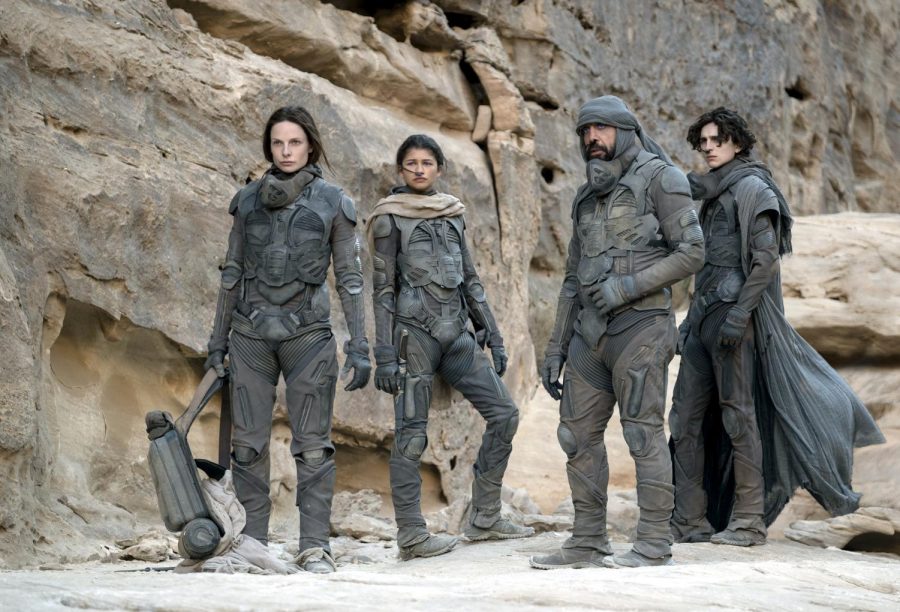“Dune”: A Space Opera With a Difference
Denis Villeneuve has, in the past decade, established himself as one of the foremost auteur directors in Hollywood, with a handful of films in different genres. The crime-thriller aspects of “Prisoners” and “Sicario,” and the sci-fi epic qualities of “Arrival” and “Blade Runner 2049,” made him the kind of jack-of-many-trades which could allow him to film a novel that had proven in the past unfilmable. Frank Herbert’s “Dune,” considered one of the 20th century’s science fiction masterpieces, has been subject to two filming attempts. One, by Alejandro Jodorowsky, fell through and was never produced. The other was directed by David Lynch, which was a critical and commercial failure in 1984. Many “Dune” fans were pensive as Denis Villeneuve cast, shot, and produced his version after having waited for over a year. What would end up as the first of a two-film series had its release date pushed back further and further because of COVID. However, its release and subsequent praise have shown that Denis Villeneuve has finally created a worthy adaptation of what was thought to be an “unfilmable” novel.
The world of “Dune” is complex and rich in its history and culture. Briefly, the plot revolves around the desert planet of Arrakis, which houses a great but finite quantity of what is known as “spice,” a compound that has the power to fuel spaceships at extremely fast speeds, but which is consumed by the locals for its psychoactive qualities. Arrakis has long been controlled by the Harkonnen family, who have ruled with an iron fist, showing no mercy to the people of the planet. The emperor has, in a convoluted political maneuver, shifted stewardship of Arrakis to the Atreides family, led by patriarch Leto (Oscar Isaac). As Leto, his wife Jessica (Rebecca Ferguson), and their son Paul (Timothée Chalamet) depart their home planet for Arrakis, the Harkonnens begin a plan to obliterate the Atreides family and take back control of Arrakis and the spice trade. As they settle on Arrakis, the Atreides family deals with their new lifestyle, the incoming attack from the Harkonnens, and Paul’s newfound abilities in telepathy and other skills. The conflict comes to a head as the Harkonnens begin their attack to take back Arrakis, and Paul has to decide between a life of leading the Atreides family and their conquests, or exploring Arrakis and finding the strange woman (Zendaya) whom he has often dreamt of.
Villeneuve’s foremost interest is in the conjunction of technical aspects to create a singular experience – that of transporting the viewers into the world of Arrakis with all of its landscapes, people, and events. The production design, sound design, cinematography, and visual effects all work together in exactly this way, and Arrakis becomes a real world that envelops the watcher. And Arrakis is portrayed dutifully – although it does not contain 100% of the portion of Frank Herbert’s novel that it represents, it is still faithful to the text and represents Herbert’s vision.
The performances, although they have not been especially noted by awards ceremonies this year, are still commendable. Chalamet’s turn as Paul Atreides shows depth and range as if he is giving a lead performance in some kind of sci-fi Shakespeare play. Many side performances are played by unlikely actors, but it still works well. Jason Momoa’s Duncan Idaho is an unexpectedly dramatic turn from the “Aquaman” star, and he has great chemistry with Chalamet. Oscar Isaac gives another seemingly classical performance as the Atreides patriarch Leto, and Stellan Skarsgard is nearly terrifying as Vladimir Harkonnen.
“Dune” has been released both on HBO Max and in theaters, and although many will prefer the seemingly long-forgotten experience of the movie theater, both ways of watching will still immerse the prospective viewer in a sci-fi experience which is as expansive as it ever has been, and which is immensely rewarding. It is up to Villeneuve to again deliver the conclusion to his duology in the coming years.
4/5 Stars












